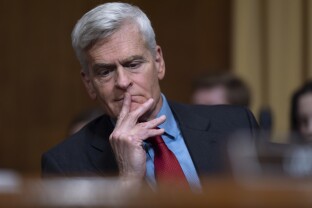Louisiana Sen. Bill Cassidy, a physician and leading voice on public health in the chamber, called for a key government vaccine panel to postpone its upcoming meeting after the stunning exodus of top leaders Wednesday at the Centers for Disease Control and Prevention.
“Serious allegations have been made about the meeting agenda, membership and lack of scientific process being followed for the now announced September ACIP meeting,” Cassidy said in a statement Thursday, referencing the Department of Health and Human Services Advisory Committee on Immunization Practices.
“These decisions directly impact children’s health and the meeting should not occur until significant oversight has been conducted,” he added. “If the meeting proceeds, any recommendations made should be rejected as lacking legitimacy given the seriousness of the allegations and the current turmoil of CDC leadership.”
Cassidy’s statement regarding the meeting, which was supposed to be held on Sept. 8, comes just hours after the Trump administration announced that it had fired CDC Director Susan Monarez.
Monarez, who was confirmed in July, was reportedly at odds with Health and Human Services Secretary Robert F. Kennedy Jr.’s desire to change U.S. vaccine policy. On Wednesday, Kennedy announced that he was narrowing COVID-19 vaccine approvals to older people and higher-risk groups.
Monarez refused to commit to supporting the change, and Kennedy subsequently asked her to resign, according to The New York Times. Monarez refused to step down, instead reaching out to Cassidy, who pushed back against Kennedy.
Monarez’s firing led three other high-ranking CDC officials to announce their resignation from the agency: Demetre Daskalakis, director of the National Center for Immunization and Respiratory Diseases; Daniel Jernigan, director of the National Center for Emerging and Zoonotic Infectious Diseases; and Debra Houry, the CDC’s chief medical officer and deputy director for program and science.
All pushed back against RFK Jr.’s tenure as head of HHS. Daskalakis penned a lengthy letter on X, saying that the views Kennedy and his staff “have shared challenge my ability to continue in my current role at the agency and in the service of the health of the American people.”
“I am not sure who the Secretary is listening to, but it is quite certainly not to us,” he wrote. “Unvetted and conflicted outside organizations seem to be the sources HHS use over the gold standard science of CDC and other reputable sources.”
And Monarez’s attorney, Mark Zaid, issued a statement Wednesday stating that his client is being “targeted” for refusing to “rubber-stamp unscientific, reckless directives and fire dedicated health experts.”
Cassidy said on social media Wednesday that these “high profile departures will require oversight by the HELP committee.”
Cassidy expressed skepticism over Kennedy’s nomination to lead HHS during his confirmation hearings earlier this year, and only decided to confirm him after “several intense conversations.” Cassidy has also previously pushed back against Kennedy’s termination of ACIP board members and his cutting of mRNA vaccine grants.
Republicans in his state have expressed their frustration with Cassidy over his resistance to parts of Kennedy’s Make America Healthy Again agenda, which is popular in Louisiana.
Sign in
Log into your free account with your email. Don’t have one?
Check your email for a one-time code.
We sent a 4-digit code to . Enter the pin to confirm your account.
New code will be available in 1:00
Let’s try this again.
We encountered an error with the passcode sent to . Please reenter your email.


